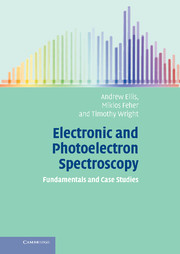Book contents
- Frontmatter
- Contents
- Preface
- List of journal abbreviations
- Part I Foundations of electronic and photoelectron spectroscopy
- 1 Introduction
- 2 Electronic structure
- 3 Angular momentum in spectroscopy
- 4 Classification of electronic states
- 5 Molecular vibrations
- 6 Molecular rotations
- 7 Transition probabilities
- Part II Experimental techniques
- Part III Case Studies
- Appendix A Units in spectroscopy
- Appendix B Electronic structure calculations
- Appendix C Coupling of angular momenta: electronic states
- Appendix D The principles of point group symmetry and group theory
- Appendix E More on electronic configurations and electronic states: degenerate orbitals and the Pauli principle
- Appendix F Nuclear spin statistics
- Appendix G Coupling of angular momenta: Hund's coupling cases
- Appendix H Computational simulation and analysis of rotational structure
- Index
3 - Angular momentum in spectroscopy
Published online by Cambridge University Press: 05 June 2012
- Frontmatter
- Contents
- Preface
- List of journal abbreviations
- Part I Foundations of electronic and photoelectron spectroscopy
- 1 Introduction
- 2 Electronic structure
- 3 Angular momentum in spectroscopy
- 4 Classification of electronic states
- 5 Molecular vibrations
- 6 Molecular rotations
- 7 Transition probabilities
- Part II Experimental techniques
- Part III Case Studies
- Appendix A Units in spectroscopy
- Appendix B Electronic structure calculations
- Appendix C Coupling of angular momenta: electronic states
- Appendix D The principles of point group symmetry and group theory
- Appendix E More on electronic configurations and electronic states: degenerate orbitals and the Pauli principle
- Appendix F Nuclear spin statistics
- Appendix G Coupling of angular momenta: Hund's coupling cases
- Appendix H Computational simulation and analysis of rotational structure
- Index
Summary
The quantization of angular momentum is a recurring theme throughout spectroscopy. According to quantum mechanics only certain specific angular momenta are allowed for a rotating body. This applies to electrons orbiting nuclei (orbital angular momentum), electrons or nuclei ‘spinning’ about their own axes (spin angular momentum), and to molecules undergoing end-over-end rotation (rotational angular momentum). Furthermore, one type of angular momentum may influence another, i.e. the angular motions may couple together through electrical or magnetic interactions. In some cases this coupling may be very weak, while in others it may be very strong.
This chapter is restricted to consideration of a single body undergoing angular motion, such as an electron orbiting an atomic nucleus; the case of two coupled angular momenta is covered in Appendix C. In classical mechanics, the orbital angular momentum is represented by a vector, l, pointing in a direction perpendicular to the plane of orbital motion and located at the centre-of-mass. This is illustrated in Figure 3.1. If a cartesian coordinate system of any arbitrary orientation and with the origin at the centre-of-mass is superimposed on this picture, then the angular momentum can be resolved into independent components along the three axes (lx, ly, lz). If the z axis is now chosen such that it coincides with the vector l, then clearly both lx and ly are zero and lz becomes the same as l.
Information
- Type
- Chapter
- Information
- Electronic and Photoelectron SpectroscopyFundamentals and Case Studies, pp. 12 - 14Publisher: Cambridge University PressPrint publication year: 2005
